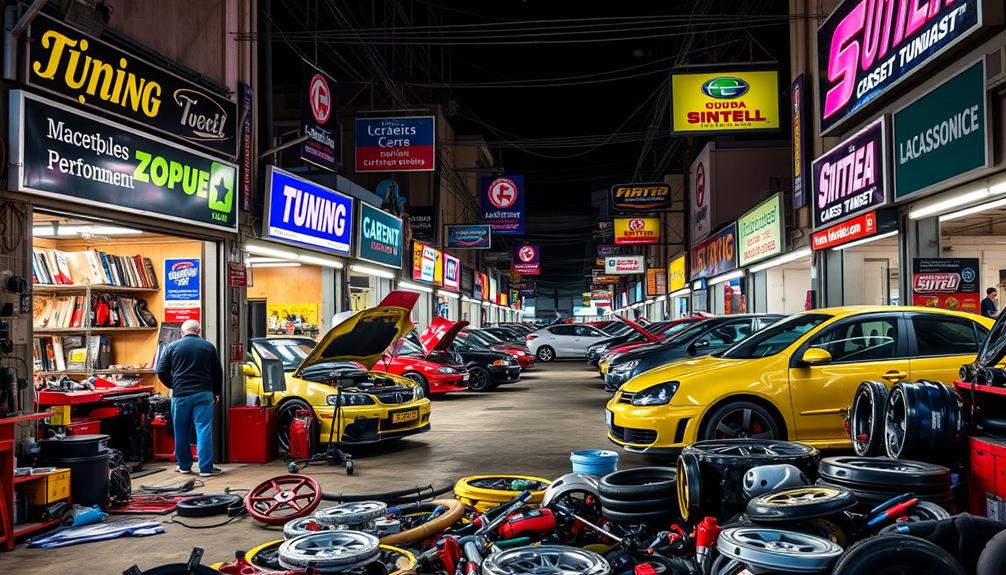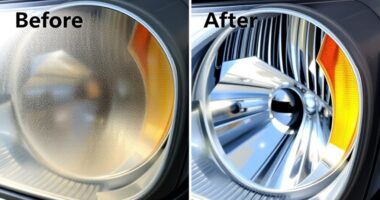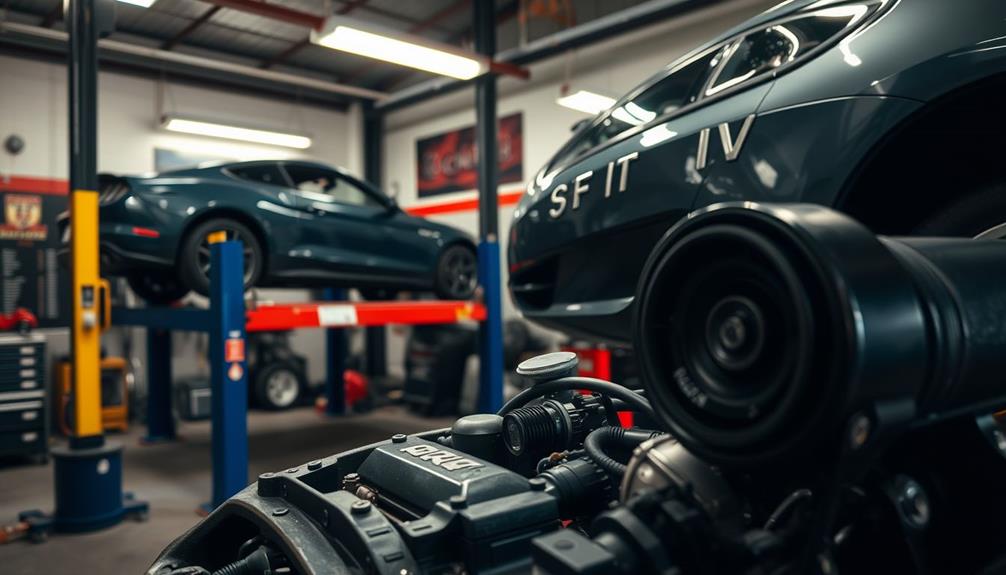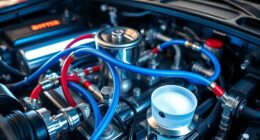You need a car tune-up when you notice warning signs like a check engine light or unusual noises. If your vehicle struggles to start or shows decreased fuel efficiency, it's time for a tune-up. Regular maintenance is recommended every 30,000 to 40,000 miles, including spark plug replacements and oil changes. Ignoring these issues can lead to serious problems and costly repairs. Keeping an eye on these indicators will help maintain your car's performance and safety. Want to know more about specific signs or maintenance tasks? There's plenty more guidance on how to keep your vehicle in top shape.
Key Takeaways
- Monitor warning indicators like the check engine light, which often signals the need for immediate professional inspection.
- Look for performance issues such as difficulty starting, unusual noises, or decreased fuel efficiency as signs a tune-up is needed.
- Regularly replace spark plugs every 30,000 to 40,000 miles to maintain optimal engine performance.
- Pay attention to oil change intervals; synthetic oils should be changed every 7,500 to 15,000 miles.
- Schedule professional inspections if dashboard lights are on, as they can prevent minor issues from escalating into costly repairs.
Importance of Regular Tune-Ups
Regular tune-ups are essential for keeping your vehicle in peak condition. Engaging in regular maintenance helps enhance vehicle performance and fuel efficiency, addressing potential issues before they turn into costly repairs. When you schedule preventative tune-ups, you're not just ensuring your car runs smoothly; you're also extending the lifespan of the engine and its components.
Safety on the road is another critical aspect that regular tune-ups improve. By identifying mechanical problems early, you reduce the risk of breakdowns or accidents. Maintaining a consistent tune-up schedule also preserves your vehicle's resale value. Buyers often favor well-maintained cars with documented service history, making your investment worthwhile.
Regular inspections during tune-ups promote early problem detection, saving you money on future repairs and enhancing overall vehicle reliability. You can drive with peace of mind, knowing that your car is in prime condition.
Signs Your Car Needs Attention
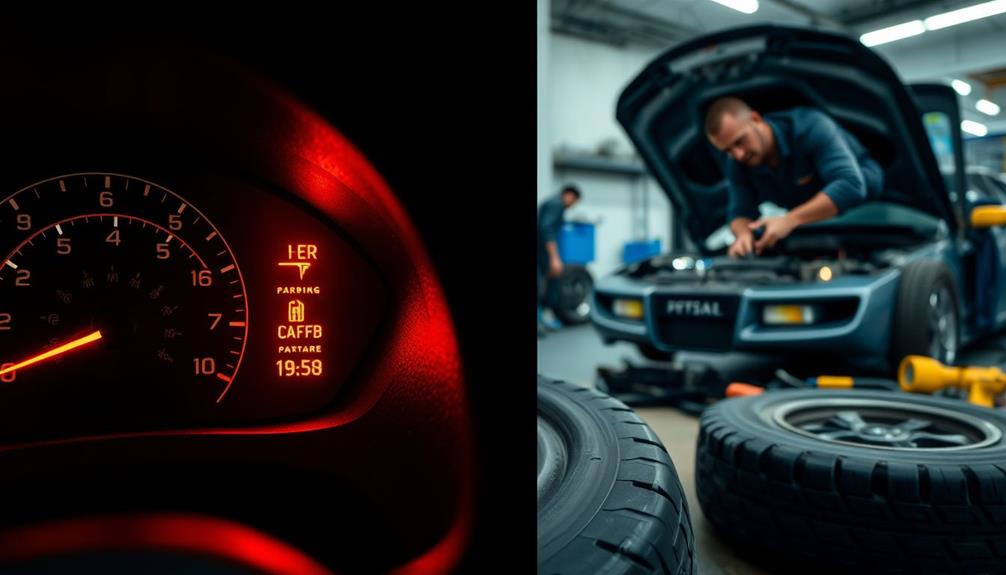
Your car can send you clear signals when it requires attention, and recognizing these signs early can save you from expensive repairs down the line. Here are some key indicators that your vehicle might need immediate attention:
| Sign | What It Means |
|---|---|
| Check Engine Light | Indicates potential engine problems |
| Difficulty Starting | Suggests issues with battery or ignition |
| Unusual Noises | May signal mechanical problems |
| Decreased Fuel Efficiency | Points to engine inefficiencies |
| Stalling During Acceleration | Indicates serious engine or fuel issues |
If your check engine light comes on, don't ignore it; it often signals a problem that could lead to further damage. Difficulty starting your car could be due to issues with the battery or spark plugs, requiring prompt inspection. Additionally, if you hear unusual noises or experience vibrations while driving, it's crucial to address these mechanical issues for safety. Finally, decreased fuel efficiency is a red flag that suggests a tune-up might be needed. Keep an eye out for these signs to guarantee your car runs smoothly and safely.
Key Components of a Tune-Up

When it comes to keeping your car in top shape, understanding the key components of a tune-up is vital. One of the primary areas to focus on is the spark plugs. You should replace them every 30,000 to 40,000 miles to guarantee peak engine performance.
Oil changes are equally important; depending on your vehicle, synthetic oils can last between 7,500 to 15,000 miles.
Don't overlook necessary filters, including air, oil, fuel, and PCV filters. Inspect and replace them as needed to keep contaminants from damaging your engine.
Belts and hoses should also be part of your tune-up checklist, with belts typically lasting 50,000 to 100,000 miles and hoses requiring regular leak checks.
Common Maintenance Services
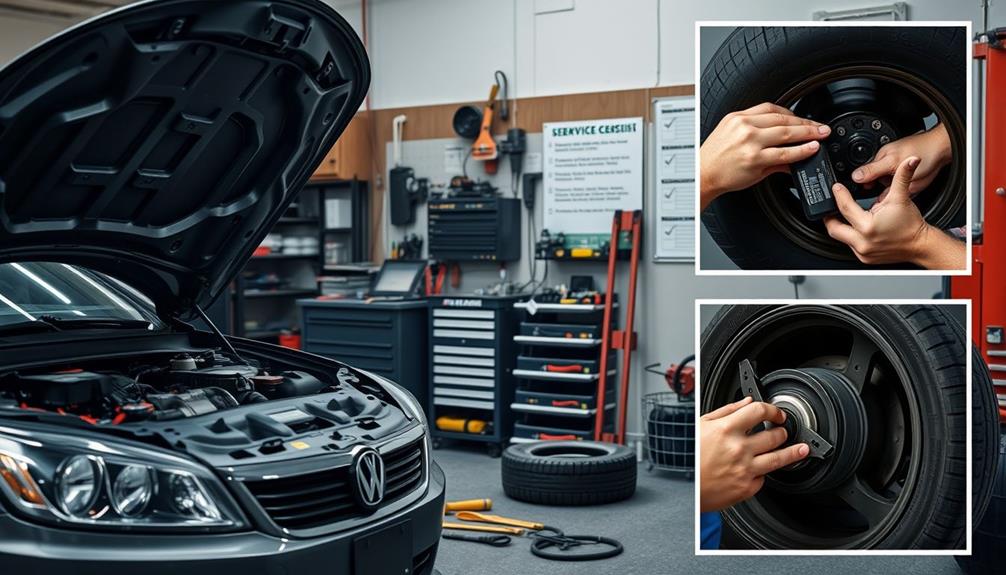
What common maintenance services should you consider during a tune-up? First and foremost, an oil change is fundamental for keeping your engine running smoothly. Regularly replacing the oil guarantees that your engine remains well-lubricated and can prevent costly car repairs down the line.
Next, don't overlook the importance of replacing your fuel filter. This simple task helps maintain ideal fuel flow, which is essential for efficient engine performance.
While you're at it, make sure to check your brake fluid and engine coolant levels. Top these off as needed; they're critical for your vehicle's safety and functionality.
Tire rotation and alignment checks should also be part of your tune-up services to promote even tire wear and improve handling.
Additionally, battery testing and terminal cleaning can prevent starting issues, assuring reliable electrical performance.
Lastly, regular inspections of belts and hoses are imperative. They help identify wear before it leads to potential breakdowns.
Understanding Warning Lights
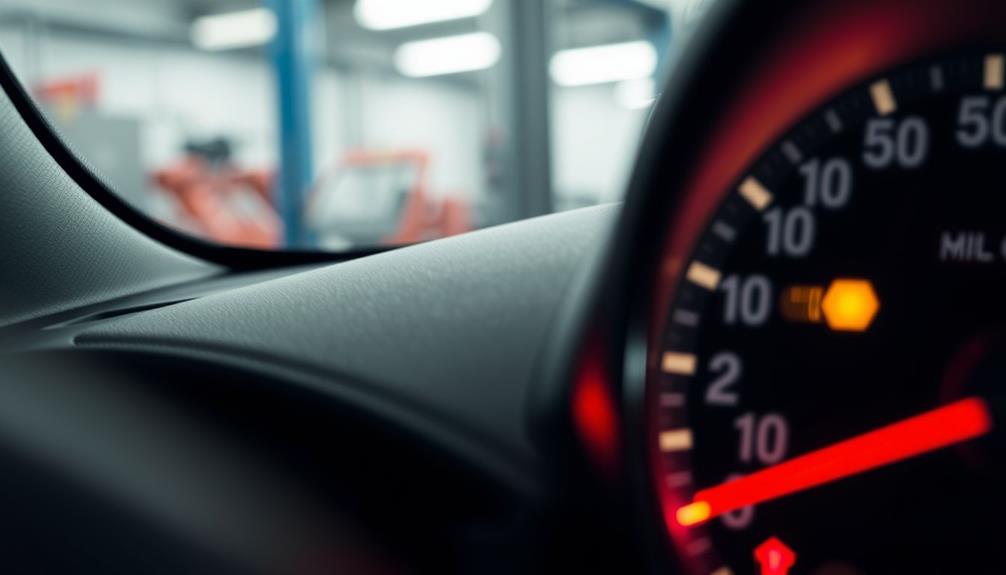
When you see a warning light on your dashboard, it's a signal that something needs your attention.
Ignoring these indicators can lead to serious issues, so it's essential to understand what they mean.
Knowing when to seek professional inspection can save you time and money in the long run.
Common Warning Light Indicators
Dashboard warning lights flash essential alerts about your vehicle's health, helping you catch potential problems before they escalate. Ignoring these warning lights can lead to severe issues and costly repairs. It's imperative to understand what each light signifies to maintain your vehicle properly.
Here's a quick reference table for common warning lights:
| Warning Light | Meaning | Action Needed |
|---|---|---|
| Check Engine Light | Engine problems detected | Check your owner manual |
| Oil Pressure Light | Low oil pressure, potential damage | Schedule a tune-up |
| Battery Light | Charging system issues | Inspect battery and alternator |
| Tire Pressure Light | Low tire pressure | Inflate tires, check for leaks |
Each light plays a role in your vehicle's maintenance. The check engine light can indicate serious issues, while lights like the oil pressure and tire pressure require immediate attention to avoid engine damage. Always refer to your owner manual for specific details. If uncertain, consult a certified mechanic to guarantee timely maintenance and keep your vehicle running smoothly.
Immediate Action Required
Ignoring warning lights can put your vehicle at risk for serious damage. Dashboard warning lights act as vital indicators of potential engine malfunctions, signaling you to take immediate action. For instance, the check engine light could point to anything from minor sensor issues to significant engine failures. If you brush these warnings aside, you may face worsening conditions that lead to costly repairs down the line.
It's important to pay attention to these alerts, as they often indicate problems with your vehicle that require your attention. Many modern vehicles come equipped with onboard diagnostics that can provide specific error codes when a warning light activates. This feature can help you identify the exact issue and address it promptly.
Regular maintenance is key to preventing these warning lights from appearing in the first place. By staying on top of regular checks, you can catch potential problems before they escalate into serious engine malfunctions.
Don't wait until it's too late—take those dashboard lights seriously, and make sure you're protecting your vehicle and your wallet.
Professional Inspection Importance
Regularly heeding warning lights on your vehicle is essential for preventing minor issues from escalating into major problems. These dashboard indicators are vital for identifying potential engine malfunctions, and ignoring them can lead to severe damage and costly repairs.
For instance, the check engine light often signals issues with the engine or emissions system, prompting the need for immediate professional inspection. Understanding your vehicle's common financial terms can also help in budgeting for necessary repairs and maintenance.
Many drivers might overlook warning lights unless they notice symptoms like strange noises or decreased performance. However, it's important to approach these warnings proactively. Regular maintenance and inspections can greatly reduce the likelihood of warning lights activating since preventive checks help catch problems early.
If you've attempted self-repairs but the warning lights remain on, a certified mechanic should reset them to guarantee accurate diagnostics.
Cost Considerations for Tune-Ups

When budgeting for a car tune-up, it's important to take into account the varying costs involved. A basic tune-up typically ranges from $40 to $150, but if your vehicle has specialized needs, costs can soar between $200 and $800.
Factors influencing these prices include your vehicle's type, age, and the complexity of the required repairs.
Regular maintenance is vital, as it can help prevent costly repairs that arise from neglecting your tune-up needs. If you add services like brake inspections or fluid changes during your visit, be prepared for an increased total cost.
Also, don't forget to check your warranty details. Some repairs might be covered, greatly reducing out-of-pocket expenses for vehicle owners. Knowing what's covered can help you make informed decisions about your maintenance budget.
DIY Vs. Professional Services
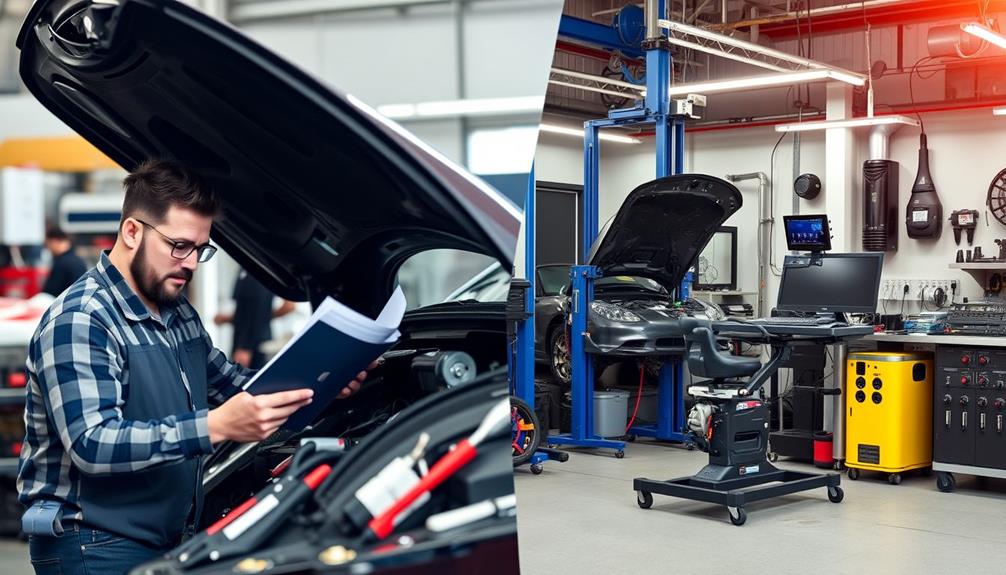
When deciding between DIY and professional services for your car tune-up, consider the cost, expertise, and tools involved.
While DIY can save you money on simple tasks, professional mechanics offer the reliability and specialized knowledge needed for more complex issues.
Ultimately, weighing the benefits of safety and efficiency against your own skills will guide your choice.
Cost Considerations
Deciding between a DIY car tune-up and hiring a professional can considerably impact your wallet. DIY maintenance can save you money on simple tasks like oil changes and air filter replacements, costing between $20 to $50 for materials. In contrast, professional services typically charge $100 to $200 for similar tasks. However, if your vehicle's age or the complexity of repairs increases, you might face higher costs.
Here's a quick comparison of DIY vs. professional services:
| Cost Factors | DIY Maintenance | Professional Services |
|---|---|---|
| Basic Tasks | $20 – $50 | $100 – $200 |
| Complex Repairs | Varies (parts only) | $150 – $800 |
| Expertise Required | Limited | Extensive |
| Safety Concerns | Potential | Minimally |
While DIY maintenance can be cost-effective, consider the potential risks. Professional services offer expert knowledge and tools, helping to prevent costly mistakes. Weigh these cost considerations carefully based on your vehicle's age and the nature of the repairs needed before making your decision.
Expertise and Tools
Choosing between DIY maintenance and professional services often boils down to the expertise and tools available for the job. While you might save some money tackling minor tasks like oil changes or air filter replacements yourself, professional services bring specialized tools and knowledge that can make a significant difference.
Professional mechanics have access to advanced diagnostic equipment that can uncover issues you might miss during a DIY check. This is especially vital for newer vehicles, which often feature complex electronic systems that require professional expertise for proper maintenance and repair.
Moreover, if you attempt repairs that don't align with manufacturer specifications, you risk voiding your vehicle's warranty. In contrast, professional services typically adhere to these guidelines, preserving your coverage.
Time efficiency is another factor leaning toward professional services. Experienced technicians can complete tune-ups and repairs faster than the average DIY enthusiast, allowing for a more convenient maintenance experience.
Ultimately, weighing your expertise and the right tools against the benefits of professional services will help you make the best choice for your vehicle.
Safety and Reliability
While weighing the options between DIY maintenance and professional services, safety and reliability come to the forefront. You might think you can save money by tackling small tasks yourself, but modern vehicles are complex, and overlooking even minor issues can lead to serious problems like car stalls.
This is similar to the importance of selecting the right cold medications for effective relief, as both scenarios highlight the need for careful consideration of potential consequences. Professional services offer the expertise and specialized tools needed to accurately diagnose and address potential safety hazards.
One of the key benefits of using certified mechanics is their ability to perform regular inspections and tune-ups. They'll thoroughly evaluate critical safety features, such as brakes and steering systems, ensuring your vehicle remains reliable on the road.
Attempting DIY repairs mightn't only compromise your vehicle's safety but could also void warranties on newer models, highlighting the importance of adhering to manufacturer guidelines.
Additionally, professional services save you time and provide peace of mind. Trained technicians can efficiently complete maintenance tasks, allowing you to focus on your daily life without worrying about your car's performance.
Ultimately, prioritizing safety and reliability means recognizing when it's best to rely on professionals for your vehicle's tune-up needs.
Frequently Asked Questions
How Can You Tell When Your Car Needs a Tune-Up?
You can tell your car needs a tune-up if the dashboard lights flash, fuel efficiency drops, it struggles to start, makes odd noises, or if it's been 30,000 miles since the last maintenance.
When Should You Take Your Car in for a Tune-Up?
Timing's tricky, but you'll know it's time for a tune-up when your car struggles to start, sputters, or shows those pesky dashboard lights. Regular checks keep your ride running smoothly and save you serious cash!
At What Mileage Does a Car Need a Tune-Up?
Most vehicles need a tune-up every 30,000 miles, but check your owner's manual for specific recommendations. If you drive in tough conditions, you might need one sooner. Keep an eye on your mileage! Here are some car tune maintenance tips to keep in mind: Regularly check and replace spark plugs, air filters, and fuel filters as necessary. It’s also important to check your vehicle’s fluids, such as oil, coolant, and transmission fluid, and replace them according to your owner’s manual recommendations. Additionally, getting a professional inspection can help identify any potential issues before they become major problems. Taking these steps can help ensure your vehicle stays in top condition and avoid costly repairs down the road.
What Is the Average Cost of a Full Tune-Up?
The average cost of a full tune-up ranges from $200 to $800, depending on your vehicle's complexity and required services. Always consult a professional for an accurate estimate tailored to your specific needs.
Conclusion
Just like a garden needs tending to flourish, your car requires regular tune-ups to thrive on the road. Ignoring the signs of wear and tear is like neglecting a wilting plant; both will suffer in the long run. By staying proactive and addressing issues promptly, you'll guarantee your vehicle runs smoothly and efficiently. Remember, investing in tune-ups today means fewer headaches tomorrow, allowing you to enjoy the journey ahead without worry. Keep your engine blooming!

